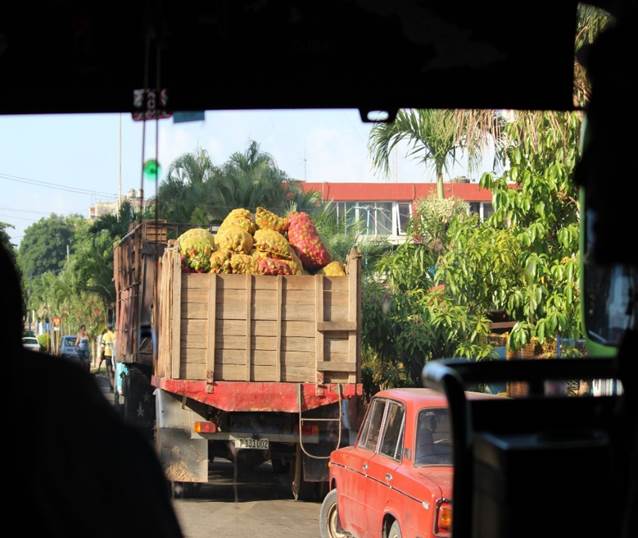June 5, 2017

At a time when farmers and ranchers are voicing concern over the possible loss of free trade with Mexico and Canada, word from the White House last week indicates President Donald Trump has his sights on reversing Obama's normalization efforts with Cuba.
Reversal of many of the former administration's pro-Cuban policies are subject to roll back, including trade discussions with Cuba, the ability of U.S. citizens to travel to and from Cuba, and establishing or re-establishing regulations for businesses interested in working in the Cuban market.
For U.S. agriculture, a move to reverse a more relaxed Cuban policy would mean death to the hopes for a more open trade relationship for goods such as food and fiber, beef, pork and poultry exports, and the hopes and plans of the U.S. dairy industry from moving into the Cuban marketplace.
No definite timeline has been announced for presidential action on Cuban policy, but the Associated Press is reporting those changes could come some time in June.
OPEN POLICY
After more than 50 years of embargo against trade and relations with the Communist country, negotiations between former President Barack Obama and Cuban President Raul Castro, initiated in 2014, led to a more open policy between the two nations after a long stretch of diplomatic hostilities spanned most of the Cold War years. Obama was the first U.S. President to visit Cuba in almost a century.
Congress has failed to address the U.S.-Cuba embargo since the Obama-Castro meetings. But in spite of only limited easing of restrictions on relationship between the two nations, Obama's initiative made some significant progress. For one, U.S. and Cuban embassies were authorized, marking the first time diplomatic relations were bridged since the early 1960s. As a result, dozens of high-level meetings between the two nations have led to limited postal service exchanges, more intelligence sharing and government cooperation on drug interdiction, emergency response and environmental challenges.
In addition, U.S. businesses have been able to strike a large number of agreements with Cuba's government, including provisions that have cleared the way for airlines and cruise lines to provide travel to and from the island, telecommunications companies to establish voice traffic and data pacts with Cuba, and an arrangement that cleared the way for expanded internet access within Cuba.
PROBLEMS FOR TRUMP
In spite of Trump's campaign rhetoric and criticism of Obama's normalization efforts, the Cuban issue presents several problems for the current administration. For one, reversing the trend to normalize relations promises to penalize business interests, including agricultural trade. Being a "business-friendly" administration means reversal efforts could be viewed as contrary to that position. Trump has often stated he opposes regulation on the business community that creates a burden or hampers their ability to access new markets.
Washington-based Engage Cuba, a group formed to promote trade and business opportunities in Cuba, estimated that American companies could lose more than $6 billion and more than 12,000 U.S. jobs if President Trump reverses normalization efforts initiated two years ago.
Even Trump advisers have reportedly cautioned the President not to disrupt a more open market policy with Cuba. Secretary of State Rex Tillerson seemed to brush aside any plans that would end Obama's initiative to normalize limited relationships with Cuba earlier this year. And Agriculture Secretary Sonny Perdue side-stepped the issue by saying he thinks "business cures a lot of ills."
Perdue led a delegation to Cuba in 2010 while governor of Georgia in an effort to promote agricultural trade.
OPPOSITION FROM FLA.
But President Trump may move toward action to reverse at least some of Obama's progress toward normalization as a result of strong support for such action by Sen. Marco Rubio, R-Florida, and Rep. Mario Diaz-Balart, R-Florida, who were staunch opponents to normalizing relationships with Cuba. Both have Cuban ties and represent political districts influenced by Cuban Americans.
Earlier this year, rumors swirled on Capitol Hill that Trump advisers garnered support for Trumpcare, or the Affordable Care Act, from Diaz-Balart based upon future action against Cuban policies.
Both Rubio and Diaz-Balart have complained that Obama's efforts have failed to initiate any meaningful change in Cuba's hard line Communist policies. But both politicians have failed to address industry accomplishments in recent months. Starwood Hotels & Resorts, for example, signed a deal with the Cuban government to operate three landmark hotels in Havana.
Critics say the move only benefits the Cuban government, and subsequently the oppressive Cuban military, because the hotel system in Cuba is government-operated.
But even critics of Obama's successes in Cuba say not all easing of policies were bad. For example, Obama cleared the way for Cuban Americans to send unlimited funds directly to family members still living on the island as a steady stream of income. It's unclear whether Trump will limit that policy.
Meanwhile, after rumors surfaced about possible Trump action this month, Cubans have been busy trying to hurry up signing contracts with U.S. firms before any changes are made.
You May Also Like




